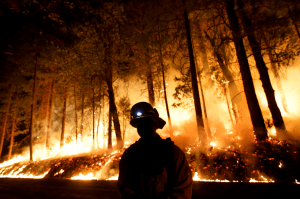California Uses Prisoners to Fight Its Wildfires
With California’s current drought problem, many residents and government officials are weary about the fire season to come. Last year’s water woes lead to the following results during the 2014 fire season:
- There were 5,620 wildfires
- Cost $184.02 million
- Burned 631,434 acres of land
- Injured 146 individuals
- Caused 2 deaths
Californians may be used to stories about major wildfires, but they may not know a lot about the individuals battling the flames. Approximately half of those fighting the fires in California are prisoners. With budget cuts and dwindling resources, the Department of Forestry and Fire Protection have resorted to using inmates as laborers.
The Department of Corrections and Rehabilitation supervises and oversees inmates in its “fire camps” program. These programs have existed since World War II and California has the largest program in the nation. Here are a few facts about the program:
- Over 4,400 prisoners are used to fight California wildfires
- Inmates are housed at 42 fire camps across California
- California saves $1 billion a year by using inmates as laborers
The inmates used in the program are convicted of misdemeanors, such as minor battery, robbery, or drug crimes. Usually, these “fire camps” are reserved for well-behaved inmates that have not committed violent acts, like sex crimes, or arson.
Corrections guards drop off the inmates at these camps and the supervising firefighters take over and are in charge the rest of the time. The prisoners are given the same clothing fire fighters wear and are allowed to carry and use chainsaws, axes, and rakes.
Many have criticized the use of prisoners in these programs and have likened the practice to modern day slavery. Prisoners earn $2 a day to fight fires and can get two days off of their sentence for every day they are out fighting fires.
In November of 2014, Proposition 47 was passed by voters and most likely will affect the “fire camp” program. Proposition 47 reduced certain felony crimes to misdemeanors. The reclassification included petty drug and theft crimes. The goal of the proposition is to reduce the crime classification as well as the prison population.
Although the voters are in favor of Proposition 47, many state agencies and departments are not as enthusiastic because it means an end to a source of cheap labor. The program has been positive, and many inmates have thrived and been rehabilitated through these fire camps. With the passage of Proposition 47, many agencies will finally have to confront their money and workforce problems because the inmate population will eventually be reduced.
State agencies should not solely rely on prison populations when hiring laborers to fight these fires. There may not be a simple solution to their budget problems, but hopefully Proposition 47 will lead to an outcome that does not solely rely on prison labor.


Comments